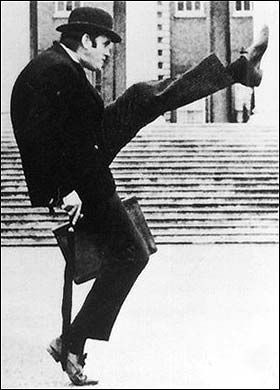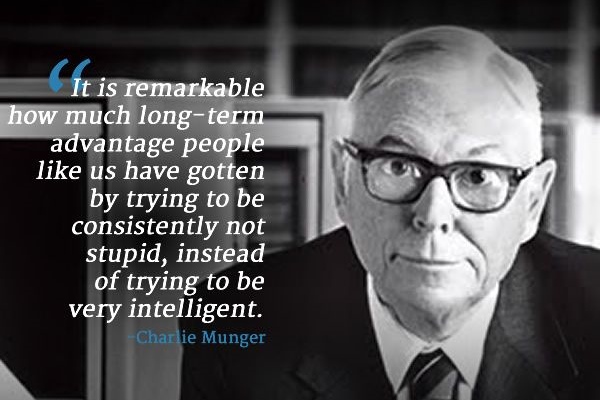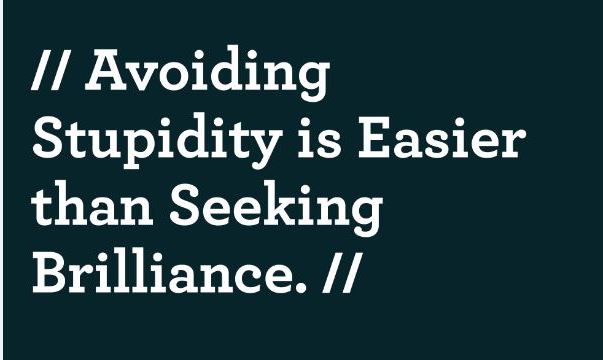How Not To Be Stupid - 4 Key Tips
Avoiding The 7 Causes Of Everyday Stupidity

How Not To Be Stupid - The Context
To figure out how not to be stupid we need to be clear about what type of stupidity we are trying to avoid.
The conventional understanding of stupidity is that it is to do with lack of intelligence and rationality which can be associated with immaturity and is often associated with a blinkered and biased perspective.
The driving purpose of this website is to help people think more effectively and a key part of this is to learn how to not think.
These skills are important because, over the long term, the outcomes that you experience are determined by how you respond to the events in your life. How you respond is shaped by the quality of your thinking.
The application of these skills will certainly help you to avoid stupidity, but this is a long term perspective. There is another level of stupidity, and this is everyday stupidity.
Everyday stupidity
In this article we are focusing on the everyday stupidity that we are all capable of whilst we are doing routine tasks in our business and working lives and also in our personal lives.
Adam Robinson, self described on his twitter account as an entrepreneur, a systems builder and shaman of global financial markets - in short a bright guy - once gave a talk to a bunch of hot-shot investors on the topic of how not to be stupid.
He reports that he spent about a month thinking about a good definition of stupidity [in the everyday context] and concluded that:
The Costs of Everyday Stupidity
What Robinson is talking about is how we regularly overlook or dismiss crucial information that is often right in front of us and the resulting human error can at a minimum cause significant hassle and inconvenience and in the worst cases cause catastrophic loss of life.
He researched many domains of stupidity, and his initial observation was that it is hard to see because most instances of stupidity - especially at a corporate and institutional level - are conveniently ignored or buried.
Colossal costs
An example of this is the number of accidental deaths in US hospitals every year, meaning that someone goes into hospital with a broken leg and doesn't come out - they died because of human error.
I don't have the source data for this but Robinson reports that the current best estimates for accidental deaths in US hospitals is in the range of 210,000 to 440,000 deaths per year. [These numbers need to be seen in the context of the approximate 30,000 deaths per year from road traffic accidents.]
Accidental deaths in hospital caused by stupidity ranks as the third leading cause of death after cancer and heart disease.
There are many other recorded instances of disasters that are well documented and in the public domain that occurred because of stupidity.
Everyday sins of omission and commission
At a less dramatic level I am sure that we have all experienced difficulties and inconveniences because of things we have not done that we should have done - such as not packing a passport, and things that we have done that we should have done - such as leaving a hot iron on on the ironing board and burning a shirt.
How not to be stupid
The first step in understanding how not to be stupid is to be aware of, and vigilant against, the causes of everyday stupidity.
The Causes of Everyday Stupidity
Robinson identified the following factors [in no order of priority]:
Any one of these factors can be enough to cause stupidity, but when two or more of these factors are present the odds of you being cognitively compromised increase dramatically.
According to Robinson all of these seven factor were present in US hospitals.
How Not To Be Stupid - 4 Key Tips

We are all human and prone to the full spectrum of human weaknesses, and we will never fully eliminate stupidity from our own behaviour.
However, we can reduce the likelihood of it occurring and take practical steps to mitigate its effects when it does.
Based on my own experience, here are 4 tips on how not to be stupid:
[1] Awareness
Review the list above of the 7 factors leading to stupidity in everyday life and relate this to your own working life and personal life.
Reflect on your current situation and also think back over the last 10 years of your life.
Ask yourself which of these factors most applies to you, or are you most susceptible to?
Read and consider the suggestions below as to how to reduce your susceptibility and how to mitigate the effects of a slip into stupidity, and devise and implement some strategies that will work for you.
For example:
- I have a personal rule that I will never make an important decision or engage in an important conversation when factors 4-7 apply. If asked, I will always refuse or reschedule.
- If or when I am in the presence of an expert I have a rule that I take nothing as given, I always look to see if or where they have skin in the game, I pay a lot of attention to trying to figure out the right questions to ask, and I try to take time out to think and reflect.
- Unless I am socialising, I find groups distracting and will always try to get physical or mental space before doing taking any action or committing to anything.
- I have well established routines and checklists for traveling that mean that I seldom if ever leave anything to chance. This leads to a relaxed and positive experience.
[2] Appoint A Consigliere
When you are making important decisions, and taking actions, that have major implications for other people's health, wealth and happiness appoint [or just ask] one or more other people to "sanity-check" your behaviour and actions.
This can a formal or informal arrangement.
We all have blind-spots, biases and weaknesses, so in my experience it is good practice and self-protective to have people in your inner circle who will tell you what you need to hear - especially when they know that you won't agree or want to hear it.
At time of writing, here in the UK, an example of this is the recent political downfall of our Prime Minister Boris Johnson who made a series of blunders over illegal staff parties that were held during Covid lockdown in 10 Downing Street [the Prime Minister's office and residence].
Johnson is not detailed oriented and has a cavalier attitude to rules and regulations and frankly was careless. These were mistakes of utter stupidity.
Unfortunately for him [and everyone else] he had sacked his own personal consigliere Dominic Cummings [a rude and objectionable man but a brilliant political operator] about 6 months prior to these events and had not replaced him with anyone who would stand up to him and tell what he didn't want to hear when he most needed to hear it.
Result? Political turmoil in the UK at a time of international crisis and a party political leadership campaign to appoint a new leader and a new Prime Minister.
Boris Johnson [and the UK] could have avoided a lot of trouble if he had known how to not to be stupid!
[3] Use Checklists
In The Checklist Manifesto we noted that a checklist is a safety net that encourages better results and prevents avoidable mistakes.
Atul Gawande the author of this book was primarily talking about the challenge facing professionals in any sphere of technical expertise and how they cope with this complexity, and specifically how they avoid making avoidable mistakes and errors of judgement.
Having researched other, non medical, areas of specialism such as the airline industry and the civil engineering and construction sector and his solution is checklists that walk these specialists through the key steps of any complex procedure.
However checklists have far wider applications and offer a simple and effective antidote to everyday stupidities.
When I was in South East Asia and flying extensively, I used checklists as a way of ensuring that I avoided stupid mistakes. I also use checklists on a range of ordinary activities. I find that not only does it reduce mistakes but it also reduces stress and helps me to adopt a more relaxed attitude to life.
[4] Adopt Antifragility
Nassim Taleb has written extensively about chaos, uncertainty and unpredictability and how to live with it. He is unconventional, an iconoclast, and a contrarian... and he talks a lot of sense!
His concept of antifragility is about preparing for the unexpected.
This is all about sacrificing a level of efficiency and having backup plans and alternatives in place to ensure that you are prepared for the unpredictable, but inevitability of, unexpected events.
As we all know, things can and do go wrong as a result of your own or other people's stupidity, or because of random and unforeseen things occurring. I recommend that you refer to, read and apply some of these proven tips in living antifragile.

Next Article: Beginners Mind And The Voice Of Experience
Return from "How Not To Be Stupid" to: Walking The Talk
LATEST ARTICLES
The Inner Weight of Shame - Sustained By Attentional Fixation
 A Mind That Is Continuously Engaged In Self-Surveillance. Shame is one of the heaviest inner burdens a human being can carry. It does not announce itself loudly or demand attention through drama. Inst…
A Mind That Is Continuously Engaged In Self-Surveillance. Shame is one of the heaviest inner burdens a human being can carry. It does not announce itself loudly or demand attention through drama. Inst…Does Prayer Work? The Psychology of Prayer, Meditation and Outcomes
 Reality Is A Complex System Of Countless Interactions - Including Yours. So does prayer work? The problem is that the question itself is usually framed in a way that guarantees confusion. We tend to a…
Reality Is A Complex System Of Countless Interactions - Including Yours. So does prayer work? The problem is that the question itself is usually framed in a way that guarantees confusion. We tend to a…Living in Survival Mode Without Surrendering Mental Authority
Living in Survival Mode Without Surrendering Mental Authority
 Clear Thinking When You’re Just Trying to Stay Afloat. Many people today are overwhelmed because they are living in survival mode - not temporarily, but as a persistent condition of life. For many, th…
Clear Thinking When You’re Just Trying to Stay Afloat. Many people today are overwhelmed because they are living in survival mode - not temporarily, but as a persistent condition of life. For many, th…Manifestation Without Magic: A Practical Model
 Manifestation without magic is not a softer or more intellectual version of popular manifestation culture. It is a different model altogether. Popular manifestation teachings tend to frame reality as…
Manifestation without magic is not a softer or more intellectual version of popular manifestation culture. It is a different model altogether. Popular manifestation teachings tend to frame reality as…Staying Committed When You Can't See Progress - The Psychology of Grit
 Uncertainty Is Not The Absence Of Progress, Only The Absence Of Reassurance. One of the most destabilising experiences in modern life is not failure, but uncertainty and staying committed when you can…
Uncertainty Is Not The Absence Of Progress, Only The Absence Of Reassurance. One of the most destabilising experiences in modern life is not failure, but uncertainty and staying committed when you can…The Battle For Your Mind - How To Win Inner Freedom In A Digital Age Of Distraction
 From External Events to Inner Events. We often think of “events” as things that happen out there: the traffic jam, the rude comment, the delayed email reply. But what truly shapes our experience is wh…
From External Events to Inner Events. We often think of “events” as things that happen out there: the traffic jam, the rude comment, the delayed email reply. But what truly shapes our experience is wh…How to See Your Thoughts Without Becoming the Story
 A Practical Guide to Thought-Awareness. You can spend your life inside the stories of your mind without ever learning how to see your thoughts clearly and objectively. Most of the stuff we tell oursel…
A Practical Guide to Thought-Awareness. You can spend your life inside the stories of your mind without ever learning how to see your thoughts clearly and objectively. Most of the stuff we tell oursel…The Collison Decision Matrix - A Simple Framework for Better Choices
 The Collison Decision Matrix Is A Practical Everyday Thinking Tool. Most of us spend a surprising amount of time worrying about decisions. From small ones such as what to wear, what to eat, what to te…
The Collison Decision Matrix Is A Practical Everyday Thinking Tool. Most of us spend a surprising amount of time worrying about decisions. From small ones such as what to wear, what to eat, what to te…The Power Of Asking The Right Question
 The Power Of Asking The Right Question Lies In The Quest For Insight. To experience the power of asking the right question you must develop the practice of asking questions. The best way to improve th…
The Power Of Asking The Right Question Lies In The Quest For Insight. To experience the power of asking the right question you must develop the practice of asking questions. The best way to improve th…Site Pathways
 Here is a site pathway to help new readers of Zen-Tools navigate the material on this site. Each pathway is based around one of the many key themes covered on this site and contain a 150 word introduc…
Here is a site pathway to help new readers of Zen-Tools navigate the material on this site. Each pathway is based around one of the many key themes covered on this site and contain a 150 word introduc…How To Live With Contradiction - Beyond Thought Let Stillness Speak
 A major impact on so many peoples' lives is the situational contradiction of unfilled realistic expectations. So where does all this leave us? Well here we are, with mental equipment that is more lim…
A major impact on so many peoples' lives is the situational contradiction of unfilled realistic expectations. So where does all this leave us? Well here we are, with mental equipment that is more lim…